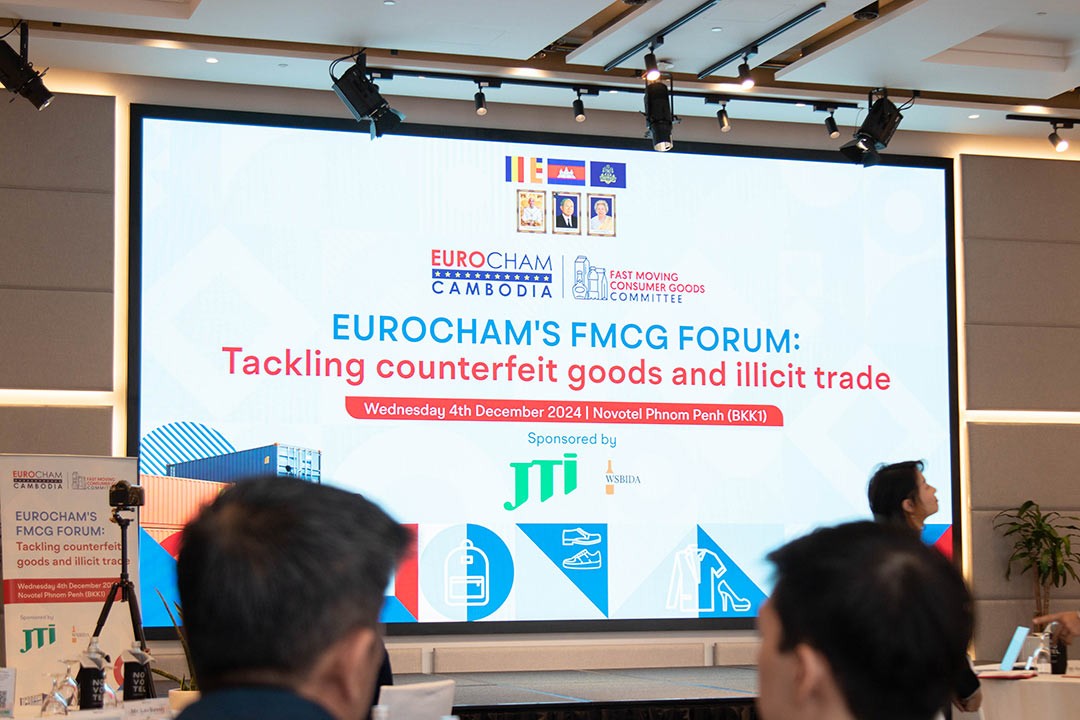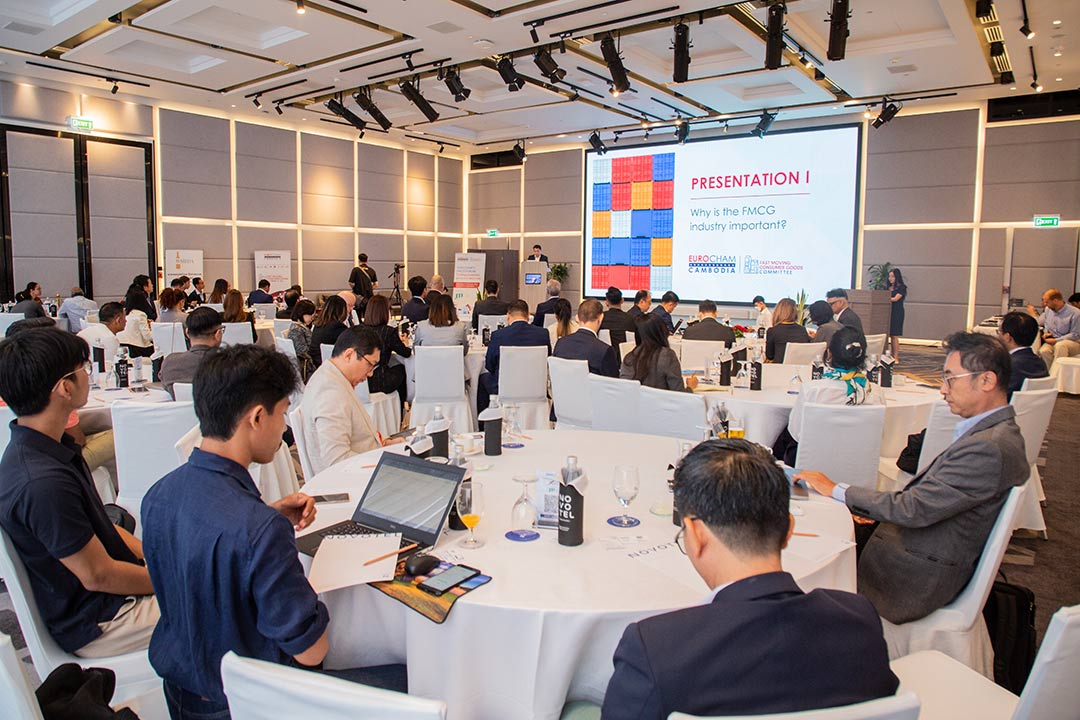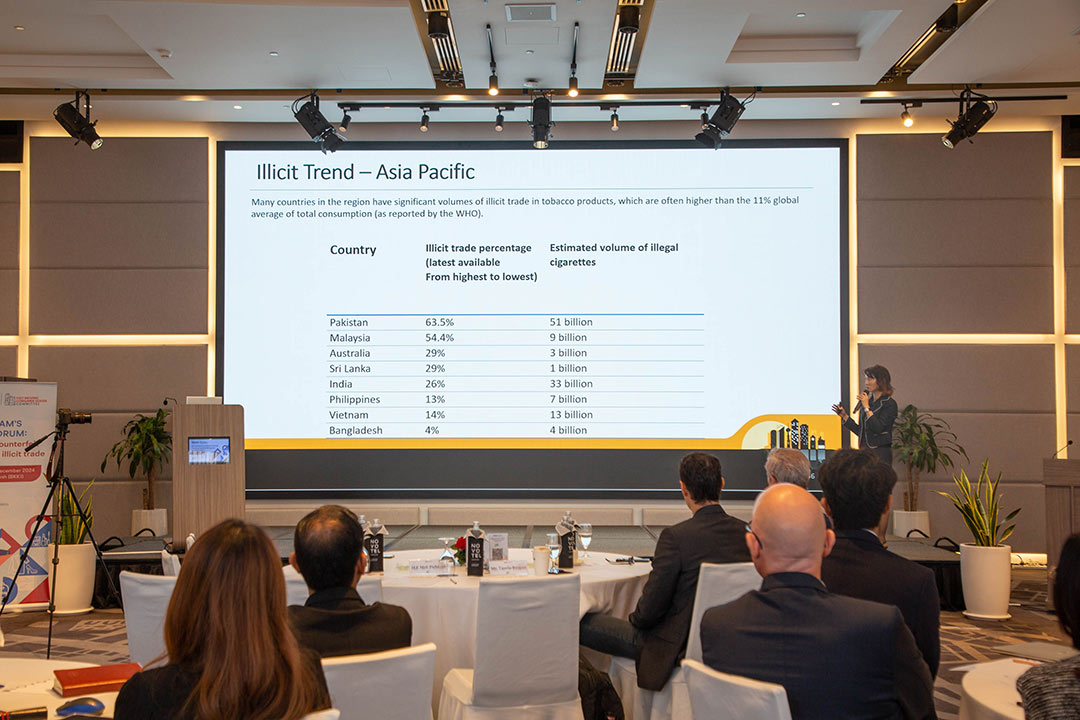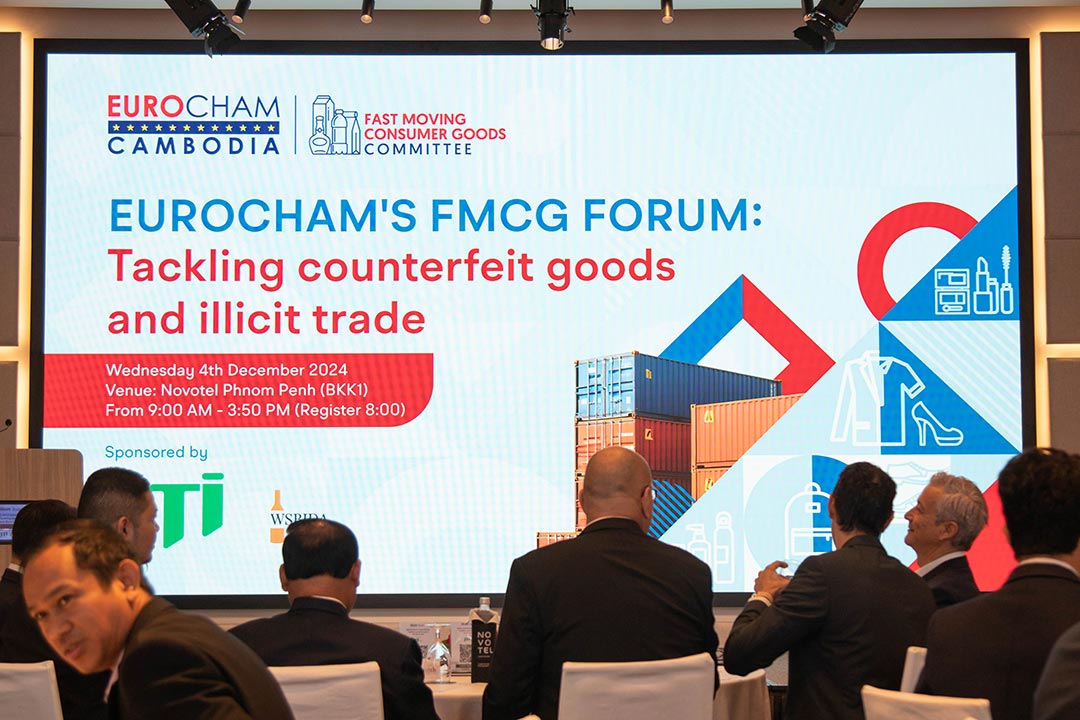
Hosted by the European Chamber of Commerce in Cambodia (EuroCham) and its Fast-Moving Consumer Goods (FMCG) Committee, with support from JTI and the Wine Spirits and Beer Importers and Distributors Association (WSBIDA), the ‘FMCG Forum: Tackling Counterfeit Goods and Illicit Trade’ was held at the Novotel Phnom Penh BKK1 on December 4, 2024.
The event brought together a diverse group of industry stakeholders, including government officials, business leaders, regulatory bodies, and consumer protection agencies, to address key challenges facing the industry, and share insights on fostering a more transparent, consumer-centric FMCG sector
The forum kicked off with a welcome remark from EuroCham’s Chairman, Tassilo Brinzer, followed by opening remarks from H.E. Mak Pichrith, Secretary of State, Ministry of Commerce, offering a macro view of the FMCG landscape, underscoring the sector's critical importance to the Cambodian economy.
“Fast-Moving Consumer Goods (FMCG) encompass a vast array of products that are sold quickly and at low cost, catering to everyday consumer needs – these goods include items such as food and beverages, personal care products, household cleaning supplies, and over-the-counter medications,” shared Pichrith.
He added:
With the fast flowing and high generative revenue from the FMCG sector, the main problem that companies, manufacturers, and distributors often face or deal with is counterfeiting and the sale of counterfeit products. Counterfeit and illegal products are a major and growing challenge worldwide, ranging from smuggling, fraud, and tax evasion to the illegal sale or possession of goods and services, costing governments billions of dollars in tax revenue and killing legitimate businesses and causing serious harm to consumers.
Pichrith noted that Cambodia's consumer protection system and policies are comparatively new in relation to other countries in the region, which has consequently meant that consumer protection still remains a relatively new concept for many Cambodians.
Since the Consumer Protection Law was enacted on November 2, 2019, the Secretary of State shared that the Ministry of Commerce, as the Chairman of the National Consumer Protection Commission, has developed and implemented several legal documents pursuant to this law, including:
- The Sub-Decree on the Management of Advertisement for Goods and Services
- Prakas on the Information Standard for Consumers
- Prakas on Dishonest Conducts related to Advertisement and Sales Promotions, etc.
Watch a snippet of H.E. Mak Pichrith's speech from EuroCham's FMCG Forum:
Brinzer also shared some of the activities EuroCham's FMCG committee has been involved with this year in dialogue with the government, including:
- A courtesy meeting with H.E. Cham Nimul, Minister of Commerce, addressing the critical importance of consumer protection in the FMCG sector
- A consultation with H.E. Koy Vanny, Secretary of State at the Ministry of Health, during which EuroCham presented its 2024 White Book and advocated for consumer protection, combating illicit trade and introducing minimum purchasing ages for alcohol and tobacco
- A meeting with H.E. DPM Sun Chanthol, addressing concerns regarding the complexity of the registration process within the FMCG sector and the need for more streamlined procedures.
Why Is The FMCG Industry Important?
Sothea Rami Sambath, Chairman of EuroCham's FMCG Committee and CEO at Auskhmer Import Export Co., Ltd., delivered a presentation discussing the central role the FMCG industry plays in the country’s economic development.
“It generates approximately 25 per cent of Cambodia's GDP, employing 500,000 workers across Cambodia, and additionally supports hundreds of thousands more, indirectly,” shared Sambath.
Cambodia's consumers market is projected to grow to 16 billion by 2025 driven by rapid organisation, a burgeoning middle class, and increasing disposable incomes. This industry does not operate in isolation, it drives other sectors like logistics, advertising and manufacturing, amplifying its economic impacts. Every dollar invested in FMCG creates significant value for the Cambodian economy.
He also noted that Cambodian consumers are changing rapidly due to the shifting market landscape.
“With 80 per cent smartphone penetration, e-commerce sales of FMCG products have grown by 20 per cent annually. Younger demographics are prioritising sustainability and ethical sourcing, therefore, FMCG brands that adopt robust customer engagement strategies like loyalty points and personalised offers are more likely to capture significant market shares,” said Sambath.

Challenges Faced By Cambodia's FMCG Sector – Counterfeit Goods And Illicit Trade
Sambath described four key challenges the FMCG sector faces, which impede its full potential:
- Regulatory and taxation bottlenecks – according to Sambath, the time to register new products in Cambodia averages six months, which is considerably longer than regional peers. Additionally, there is a 15 per cent corporate tax rate, which he described as moderate, but inconsistently enforced. Such ambiguities in tax regulation leave businesses vulnerable to arbitrary penalties.
- Advertising restrictions – Sambath said that advertising in Cambodia is often constrained by a lack of clear digital regulations, adding that over 60 per cent of Cambodian FMCG businesses find difficulties in leveraging online platforms due to unclear guidelines or platform specific bans.
- Counterfeit goods – “Counterfeiting is an ever present menace,” described Sambath, with the Cambodian market seeing a three to five per cent infiltration rate of counterfeit FMCG products (including food, beverages, wine, spirits, liquors). Inadequate enforcement mechanisms exacerbate this problem and cost the industry millions annually.
- Tax evasion and illicit trade – official trade data shows that an estimated 20 per cent of FMCG products in Cambodia are unregistered imports. These avoid duties, undercutting legally compliant businesses, which “not only robs the government of revenue, but creates an uneven playing field,” added Sambath.
Addressing these challenges will require collaborative efforts between industry leaders, policymakers and international stakeholders to: streamline registration processes, bolster digital advertising frameworks, intensify enforcement against counterfeits through technology like blockchain, put in place stronger punitive measures, and provide incentives for higher compliance via tax breaks or subsidies for firms demonstrating ethical practices.
Julian Cheung, Anti-Illicit Trade Operation Director of JTI Asia Pacific Region, a global tobacco and vaping company, also delivered a presentation specifically on the issue of the illicit tobacco trade, which she said results in a loss of around USD 40.5 to 47.4 billion in government revenue worldwide each year – an amount that is about 1.5 times Cambodia's GDP.

On the prevalence of the illicit tobacco trade in Cambodia, Cheung shared that the country currently hovers around the 25 per cent mark, just under Pakistan (63.5 per cent), Malaysia (54.4 per cent), Australia (29 per cent), Sri Lanka (29 per cent) and India (26 per cent) in the Asia Pacific region.
“Eighty per cent of the problem [in the Asia Pacific] is illicit whites (tobacco products manufactured for the sole purpose of being smuggled and sold in another market), and the countries that are involved in the manufacturing of illicit whites include China, Philippines, Indonesia, Vietnam, and more importantly, Cambodia," Cheung added.
Furthermore, she noted that the estimated loss in government revenue for Cambodia from the illicit tobacco trade is around USD 10 million per year.
According to consumer surveys, about more than 80 per cent of consumers say they wish to see better cooperation between governments and private industries for better enforcement. Over half also mention that the government and the authorities are not serious enough to take action. Those involved in criminal activities will always constantly find new ways to fund more criminal activities, so the time for action is now.
“We encourage law enforcement agencies to implement more and stronger enforcement against each level of the illegal tobacco trade, including retail outlets and production plants. We will continue to be a partner of the government to combat illegal trade and strengthen law enforcement in the country, because we believe in continuous private-public cooperation and in engaging the government to take the lead in tackling illegal trade. Collective action between us, the government and law enforcement agencies must take place,” Cheung concluded.

EuroCham’s FMCG Forum also featured presentations from Dara N. Van, Business Development Manager at Confluences Asia, on her firm’s Consumer Report 2024; and Andries Van Straten, Service Coordinator at EuroCham Cambodia, on the group’s South-East Asia IP SME Help Desk.
Two panel discussions on the business perspectives on illicit trade and counterfeit goods, and on consumer protection labelling and advertising, were also held with officials from the Department of Intellectual Property (DIP), the General Department of Customs and Excise (GDCE), and the Ministry of Industry, Science, Technology & Innovation (MISTI), in addition to representatives of legal firms and private companies.
Read More Cambodia Business News:
- Cambodia Business Climate 2024 And Future Of US-Cambodia Investment In Light Of Trump’s Presidency – Invest Cambodia 2025.
- Cambodia’s Investment Landscape Explored At ‘Invest Cambodia 2025: The Asian Tiger Of The 21st Century’.
- ADB Grants Cambodia US $50 Million Loan To Support Trade and Competitiveness.